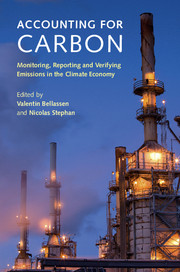Book contents
- Frontmatter
- Contents
- List of figures and map
- List of tables
- List of boxes
- Notes on contributors
- Acknowledgements
- 1 Introduction: key notions and trade-offs involved in MRVing emissions
- Part I MRV of territorial/jurisdictional emissions
- Part II MRV of industrial sites and entities
- 5 Trendsetter for companies and industrial sites: the EU Emissions Trading Scheme
- 6 Variant 1: the waste sector in Australia's Carbon Pricing Mechanism, another ETS at site level
- 7 Variant 2: non-site level emissions in an ETS–the case of electricity importers in the California cap-and-trade
- 8 Variant 3: emissions of a company/institution rather than a site: the case of the Shenzhen ETS
- 9 Variant 4: coexistence of voluntary and mandatory frameworks at the company level - Carbon Disclosure Project, EU ETS and French legal requirements
- 10 Direct measurement in the EU ETS
- Part III MRV at offset project scale
- Index
- References
9 - Variant 4: coexistence of voluntary and mandatory frameworks at the company level - Carbon Disclosure Project, EU ETS and French legal requirements
from Part II - MRV of industrial sites and entities
Published online by Cambridge University Press: 05 March 2015
- Frontmatter
- Contents
- List of figures and map
- List of tables
- List of boxes
- Notes on contributors
- Acknowledgements
- 1 Introduction: key notions and trade-offs involved in MRVing emissions
- Part I MRV of territorial/jurisdictional emissions
- Part II MRV of industrial sites and entities
- 5 Trendsetter for companies and industrial sites: the EU Emissions Trading Scheme
- 6 Variant 1: the waste sector in Australia's Carbon Pricing Mechanism, another ETS at site level
- 7 Variant 2: non-site level emissions in an ETS–the case of electricity importers in the California cap-and-trade
- 8 Variant 3: emissions of a company/institution rather than a site: the case of the Shenzhen ETS
- 9 Variant 4: coexistence of voluntary and mandatory frameworks at the company level - Carbon Disclosure Project, EU ETS and French legal requirements
- 10 Direct measurement in the EU ETS
- Part III MRV at offset project scale
- Index
- References
Summary
Introduction
Some of the earliest greenhouse gas monitoring and reporting has been done by companies and corporations – whether public or private. These companies voluntarily piloted initial quantification and reporting at the corporate level to assess the contribution of their activities to climate change. In the 2000s, with the implementation of emission trading schemes and carbon taxes, the focus shifted to site-level, without necessarily an aggregation at corporate level. To date, little to no full, mandatory, MRV systems have been put into place for corporate reporting – particularly in terms of verification. However, the coexistence of multiple mandatory and voluntary frameworks that companies participate in has implications for the efficiency of the quantification conducted as well as the use of the information in the entities’ internal “climate governance.”
This chapter first briefly presents three of the main reporting frameworks to which multiple French companies participate in or are subject to. France is a particularly interesting example as it is among the few countries – with the United Kingdom – to have made GHG monitoring and reporting mandatory at the corporate level. The second half of this chapter analyzes the impacts of this coexistence of frameworks on efficiencies and internal governance as well as the implications for a growing type of users of emissions performance data: investors.
French entities may be subject to up to four major mandatory or voluntary GHG emissions monitoring and reporting frameworks
In addition to the EU ETS (described in Chapter 5) which covers more than 1,300 French installations, French companies today participate in multiple GHG emission reporting systems. One of the earliest systems is the voluntary CDP Sustainability, formerly known as the Carbon Disclosure Project. In addition, GHG measurement and reporting has been included in statutory sustainable-development reporting requirements (including the Corporate Social and Environmental Responsibility and the mandatory development of Climate Action Plans).
- Type
- Chapter
- Information
- Accounting for CarbonMonitoring, Reporting and Verifying Emissions in the Climate Economy, pp. 283 - 312Publisher: Cambridge University PressPrint publication year: 2015



